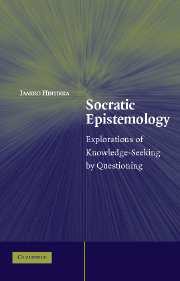Book contents
- Frontmatter
- Contents
- Acknowledgments
- Introduction
- 1 Epistemology without Knowledge and without Belief
- 2 Abduction—Inference, Conjecture, or an Answer to a Question?
- 3 A Second-Generation Epistemic Logic and its General Significance
- 4 Presuppositions and Other Limitations of Inquiry
- 5 The Place of the a priori in Epistemology
- 6 Systems of Visual Identification in Neuroscience: Lessons from Epistemic Logic
- 7 Logical Explanations
- 8 Who Has Kidnapped the Notion of Information?
- 9 A Fallacious Fallacy?
- 10 Omitting Data—Ethical or Strategic Problem?
- Index
- References
10 - Omitting Data—Ethical or Strategic Problem?
Published online by Cambridge University Press: 05 June 2012
- Frontmatter
- Contents
- Acknowledgments
- Introduction
- 1 Epistemology without Knowledge and without Belief
- 2 Abduction—Inference, Conjecture, or an Answer to a Question?
- 3 A Second-Generation Epistemic Logic and its General Significance
- 4 Presuppositions and Other Limitations of Inquiry
- 5 The Place of the a priori in Epistemology
- 6 Systems of Visual Identification in Neuroscience: Lessons from Epistemic Logic
- 7 Logical Explanations
- 8 Who Has Kidnapped the Notion of Information?
- 9 A Fallacious Fallacy?
- 10 Omitting Data—Ethical or Strategic Problem?
- Index
- References
Summary
In discussions of the ethics of science, the practice of omitting data, also referred to often as “data selection,” has played a significant role as an interesting test case of real or alleged scientific fraud. Babbage's classic taxonomy of scientific frauds distinguishes three kinds of such fraud—to wit, “forging,” “cooking,” and “trimming” of data. The meaning of these terms is obvious, with omitting data as a clear-cut case of cooking. In the literature dealing with dishonesty in science, several prominent scientists have been accused of omitting data, among them no lesser a figure than Isaac Newton, who has been charged with maintaining the impossibility of an achromatic lens while in possession of evidence suggesting the possibility of such a lens. (See Bechler 1975; Kohn 1988, 36–39.) The most thoroughly analyzed case is undoubtedly Robert A. Millikan's famous oil drop experiment, which helped him to earn a Nobel Prize. (See Franklin 1981 and 1986, ch. 5 and 229–232; Holton 1978; Broad and Wade 1982, 34–36.) As is well known, Millikan's experiments aimed principally at measuring the electric charge, e. They “depended on introducing droplets of liquid into the electric field and noting the strength of the field necessary to keep them suspended.” (Broad and Wade 1982, 34.) Contrary to his public pronouncements, Millikan excluded as many as 49 observations out of a total of 140.
- Type
- Chapter
- Information
- Socratic EpistemologyExplorations of Knowledge-Seeking by Questioning, pp. 221 - 228Publisher: Cambridge University PressPrint publication year: 2007



